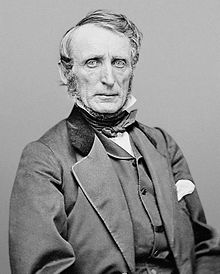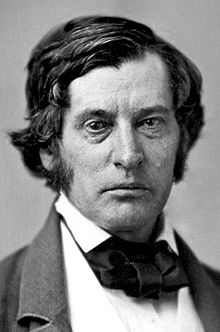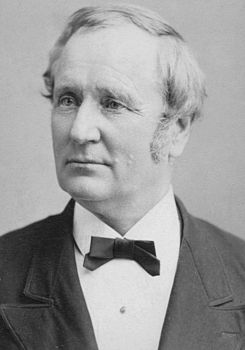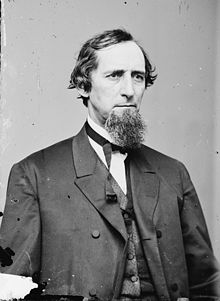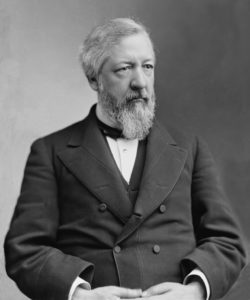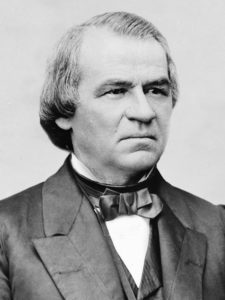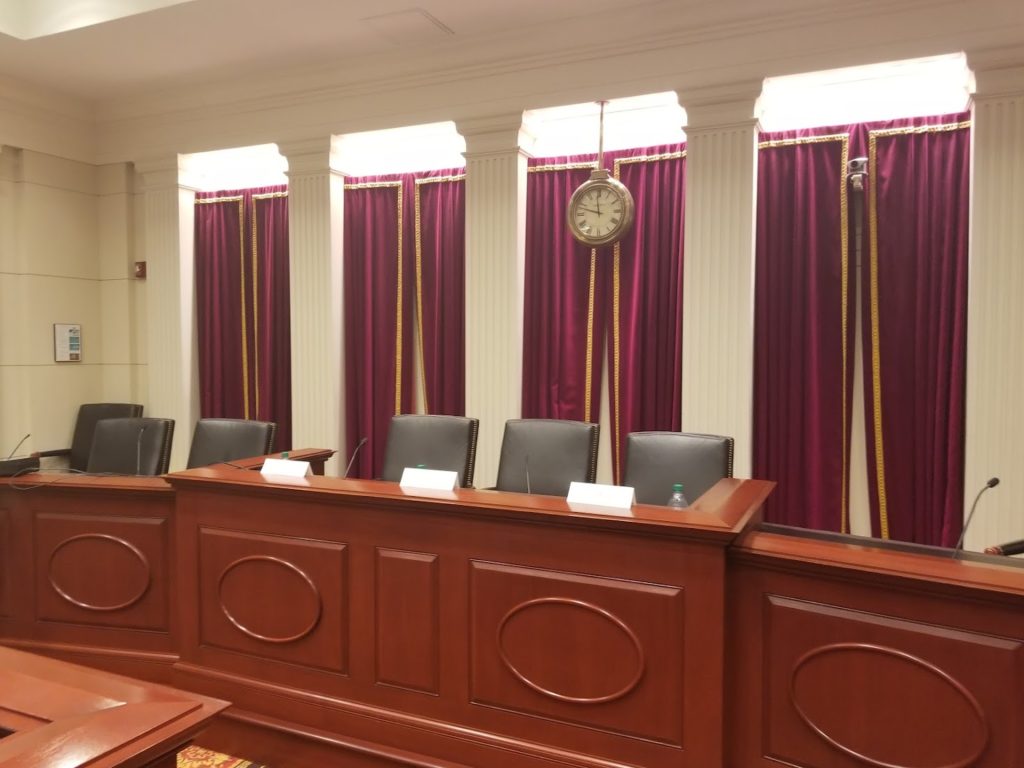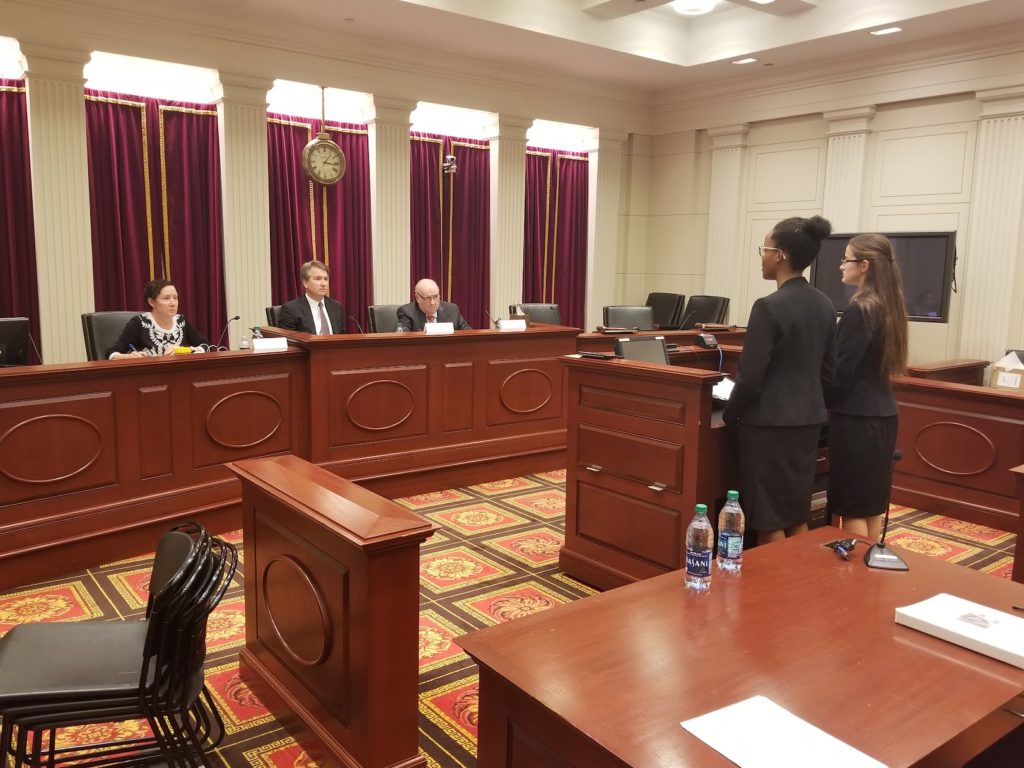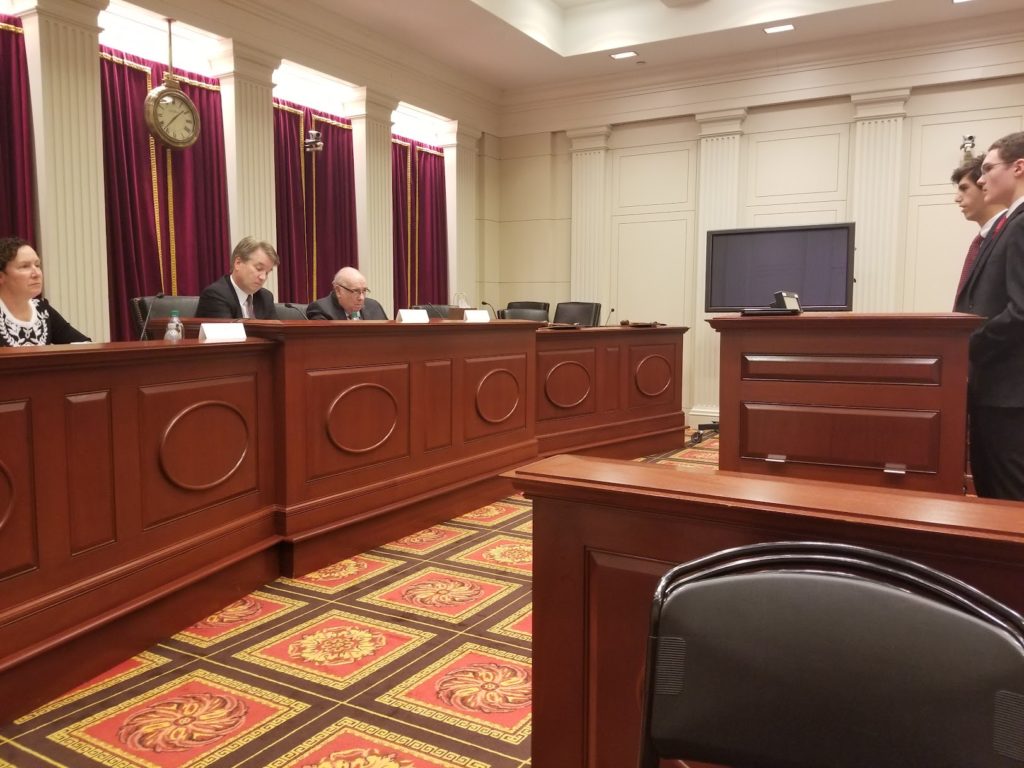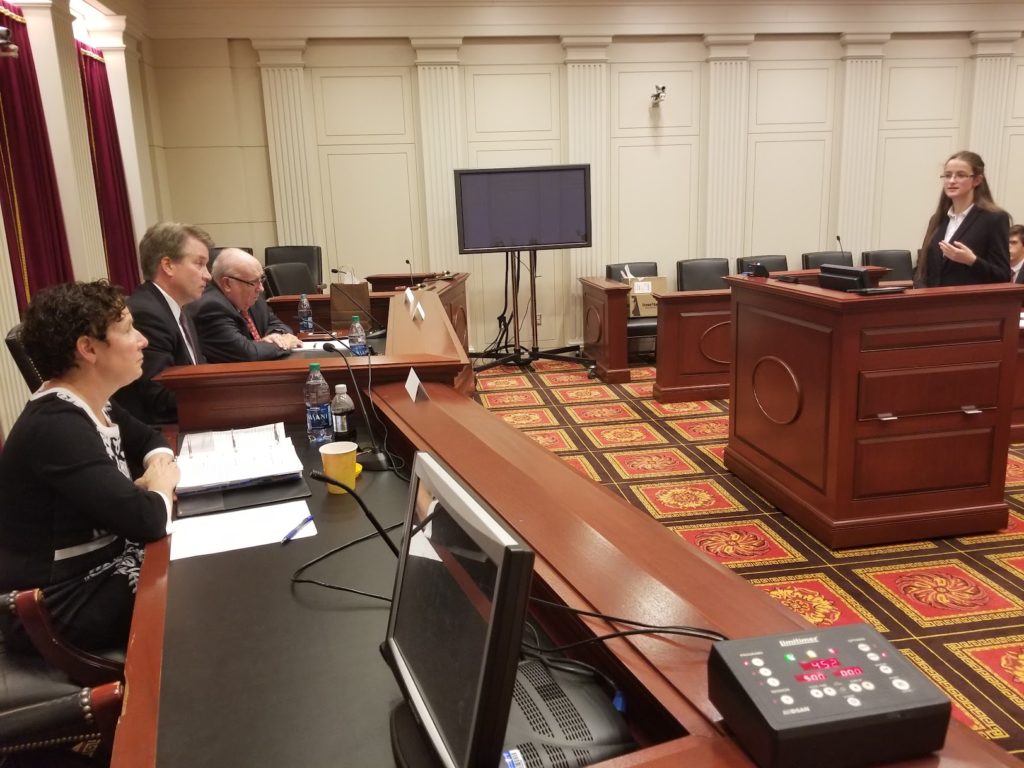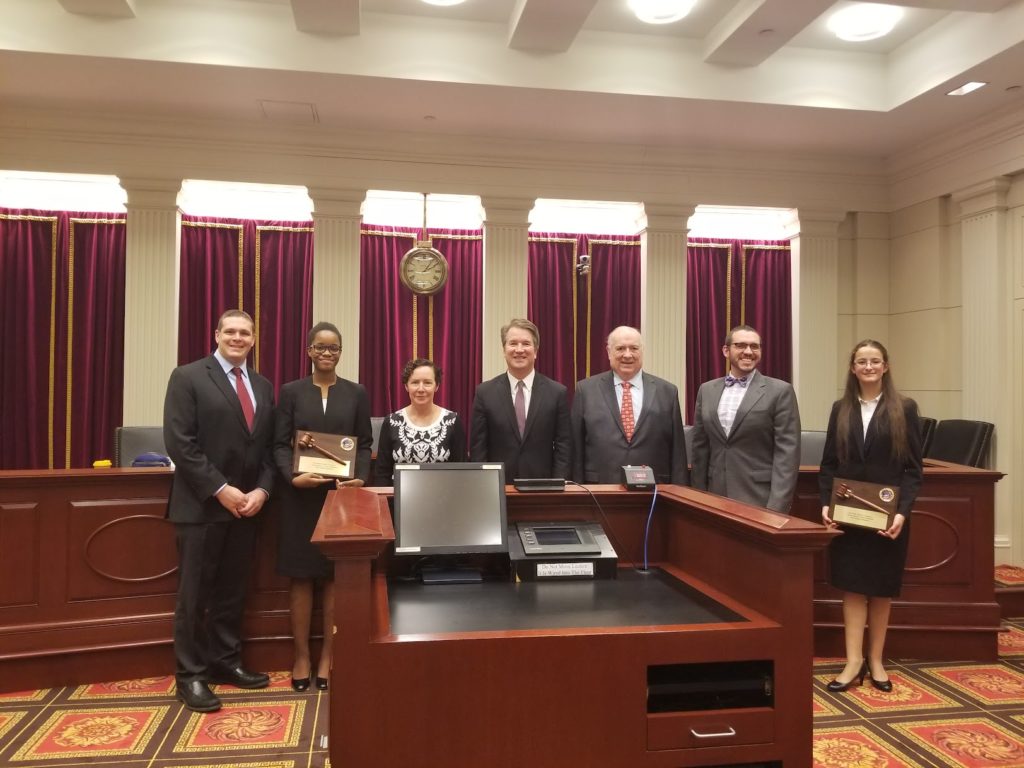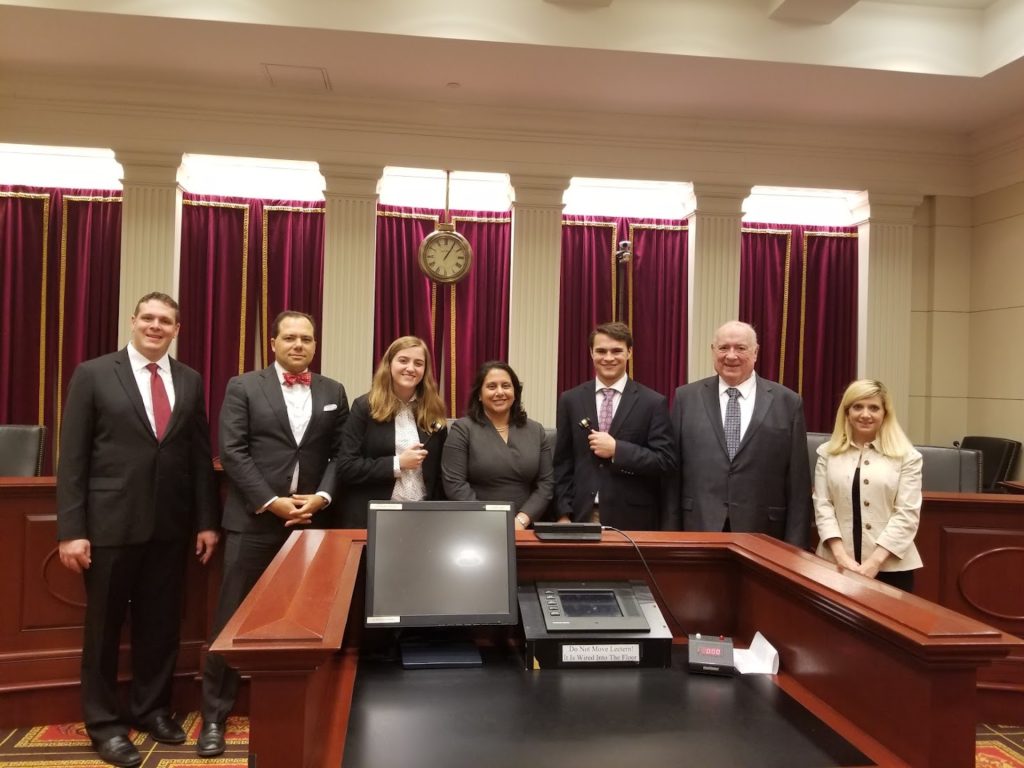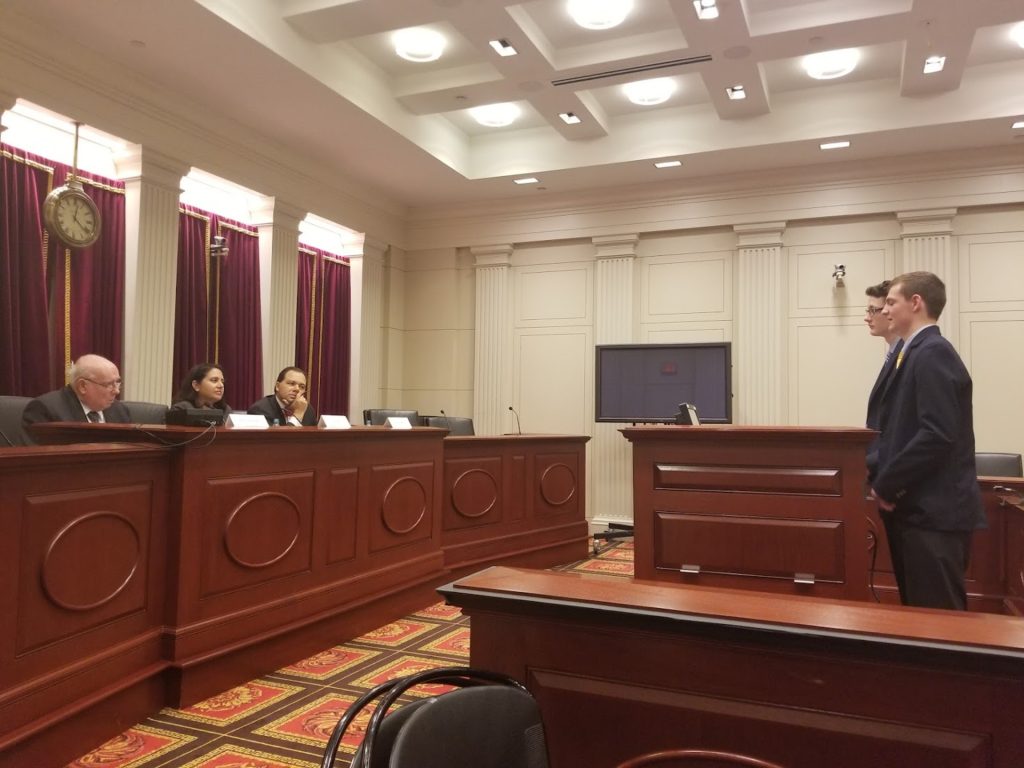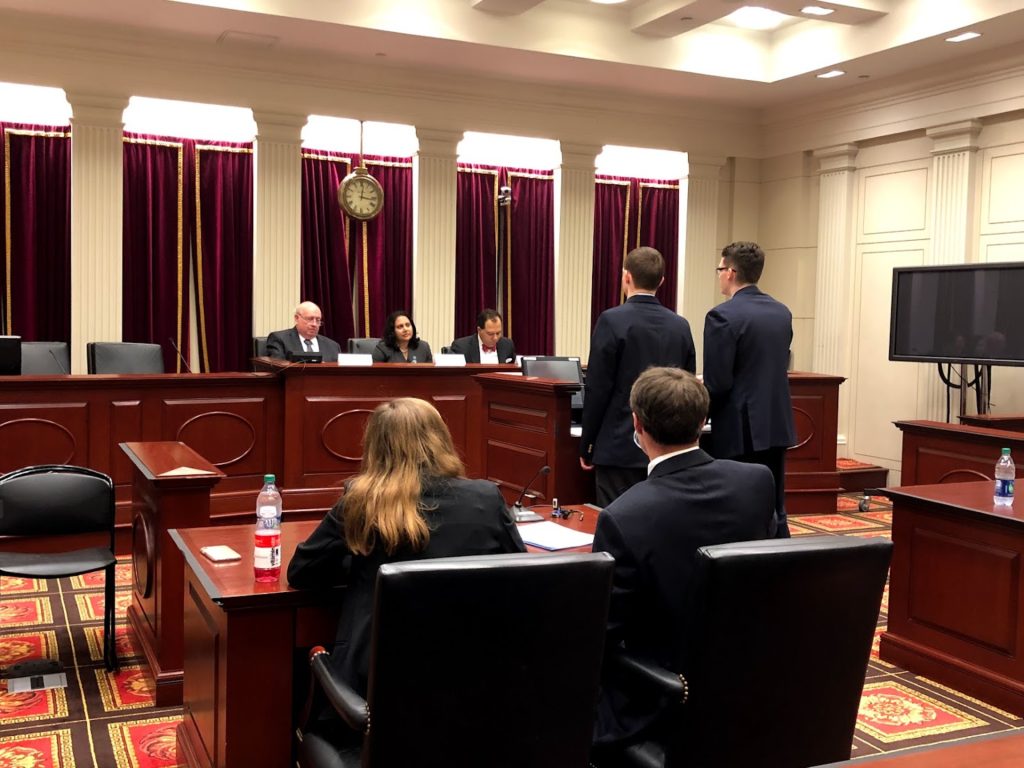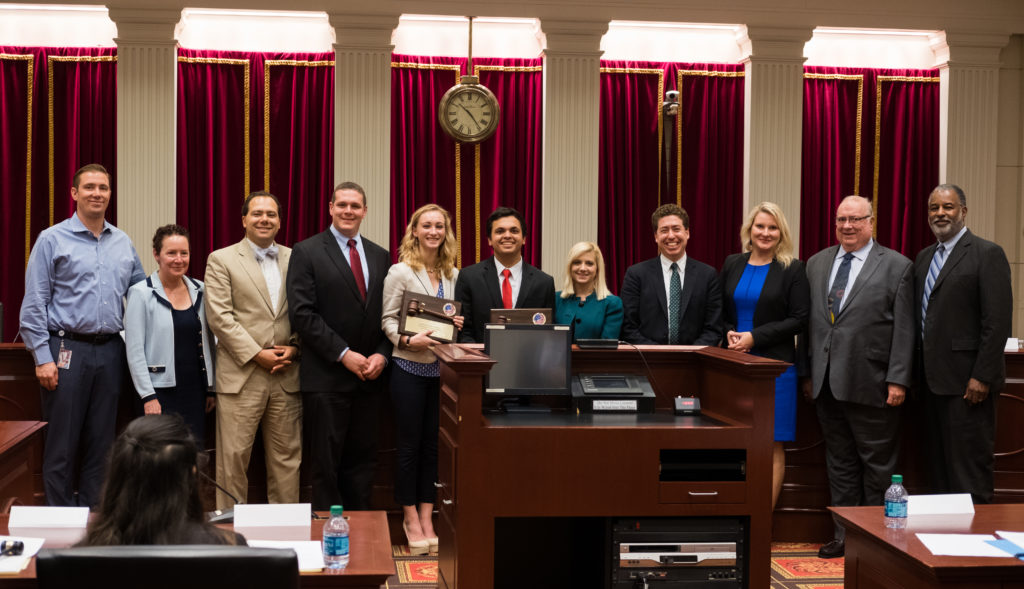Students for Fair Admission v. University of North Carolina
Middle District of North Carolina - Opinion (October 18, 2021)
Supreme Court Docket No. 21-707 (docketed on November 11, 2021)
Certiorari granted by the United States Supreme Court (January 24, 2022)
Oral Argument Scheduled for October 31, 2022.
Case Information
Parties
- Petitioner: Students for Fair Admission
- Respondents: University of North Carolina and students
Question Presented
Is race conscious affirmative action consistent with the Fourteenth Amendment to the United States Constitution?
Sources and Materials
Supreme Court Filings
Briefs from the Petitioners and Respondents:
- Petition for Writ of Certiorari
- Opposition to Petition for Writ of Certiorari
- Reply ISO of Petition for Writ of Certiorari
- Petitioners’ Merits Brief
- Respondents’ Merits Brief
- Petitioners’ Merits Reply Brief
Resources in Support of Petitioners:
- Amicus Brief of Former Attorney General Edwin Meese III
- Michael B. Rappaport, Originalism and the Colorblind Constitution, 72 Notre Dame L. Rev. 71 (2013).
Resources in Support of Respondents:
- Amicus Brief of Constitutional Accountability Center
- Amicus Brief of Professors of History and Law
- Eric Schnapper, Affirmative Action and the Legislative History of the Fourteenth Amendment, 71 Va. L. Rev. 753 (1985).
The Law
Regents of the University of California v. Bakke, 438 U.S. 265 (1978)
In Bakke, the Supreme Court addressed affirmative action in university admissions for the first time. The 5-4 majority held that U.C. Davis Medical School violated the Equal Protection Clause of the Constitution by creating an application process where 16 out of 100 spots for incoming students were reserved for minority candidates. The Court specified that, while such a “quota system” is unconstitutional, the school may use the applicant’s race as a consideration in other ways because the school has a compelling interest in encouraging diversity in its student body. The opinion was very fractured, and there was no clear majority position.
Grutter v. Bollinger, 539 U.S. 306 (2003)
In a 5-4 vote, the Supreme Court upheld a University of Michigan Law School admissions program that put “substantial weight” on an applicant’s race in order to ensure diversity on campus. The Court evaluated the constitutionality of such a program under the Equal Protection Clause, using their ruling against the quota system in Bakke as a constitutional yardstick. Justice Sandra Day O’Connor wrote the majority opinion. She found that the Constitution “does not prohibit the law school’s narrowly tailored use of race in admissions decisions to further a compelling interest in obtaining the educational benefits that flow from a diverse student body.” Because the Michigan admissions program had the goal of attaining a “critical mass” of racially diverse students on campus, it was distinguishable from the illegal hard-line quota in Bakke. Notably, Justice O’Connor also mentioned that, while diversity on campus is an important aim, this kind of affirmative action program should have a time limit; she predicted that “25 years [after this case], the use of racial preferences will no longer be necessary to further the interest approved today.”
Parents Involved in Community Schools v. Seattle School Dist. No. 1, 551 U.S. 701 (2007)
This case considered affirmative action in high schools. In Seattle, students within a district could apply to the high school of their choice. The most popular school choices become oversubscribed, so school administrators had to decide which students would receive their top choice. One of the most important factors in their decision was the student’s race, and often, the assignments would be done in such a way that would ensure racial diversity at each school. Chief Justice Roberts, writing for the five justice majority, invalidated the program. He held that it violated the Equal Protection Clause, and distinguished it from Grutter v. Bollinger because the program’s only goal was to ensure racial diversity instead of more holistic “diversity in higher education.” However, Justice Kennedy concurred, noting that diversity could still be considered in admission decisions.
Ricci v. DeStefano, 129 S. Ct. 2658 (2009)
Twenty firefighters sued the New Haven Fire Department, alleging that they were passed over for promotions solely on the basis of their race. The firefighters involved in the case, 19 white and 1 hispanic, outperformed minority candidates on a test to determine which employees would be promoted. In response, the test results were discarded and no promotions were awarded. The Supreme Court held that this action by the fire department violated Title VII of the Civil Rights Act of 1964. The five justice majority opinion was authored by Justice Kennedy, who wrote that Title VII and the Court’s decision ensures “that the workplace be an environment free of discrimination, where race is not a barrier to opportunity.”
Fisher v. University of Texas at Austin I, 133 S. Ct. 2411 (2013)
Abigail Fisher, a white student, challenged the affirmative action admission policy at the University of Texas. The Fifth Circuit upheld the policy. The Supreme Court reversed because the Fifth Circuit did not hold the University to the demanding burden of strict scrutiny articulated in Grutter and Bakke. "Strict scrutiny does not permit a court to accept a school’s assertion that its admissions process uses race in a permissible way without a court giving close analysis to the evidence of how the process works in practice."
Fisher v. University of Texas at Austin II, 136 S.Ct. 2198 (2016)
After the Supreme Court decided Fisher I, the Fifth Circuit once again upheld the University of Texas's affirmative action admission policy. Fisher appealed the case again to the Supreme Court. By a 4-3 vote, the Supreme Court upheld the policy. (The Court was short-handed because Justice Scalia's seat was vacant, and Justice Kagan was recused.) Justice Kennedy's majority opinion found that none of the other "alternatives was a workable means for the University to attain the benefits of diversity it sought."
Primary Sources - The History
Text of the Constitution
All persons born or naturalized in the United States, and subject to the jurisdiction thereof, are citizens of the United States and of the State wherein they reside. No State shall make or enforce any law which shall abridge the privileges or immunities of citizens of the United States; nor shall any State deprive any person of life, liberty, or property, without due process of law; nor deny to any person within its jurisdiction the equal protection of the laws.
Background: Framed primarily by Republican Representative John Bingham, the Fourteenth Amendment was passed by the Thirty-ninth Congress as one of the Reconstruction Amendments. It was passed in part to combat Black Codes, which were statutes passed in Southern states to limit the rights of African Americans after they were freed from slavery by the Emancipation Proclamation. These statutes borrowed elements and language from antebellum slave laws and restricted rights, such as the right to move freely, vote, and testify in court. The Fourteenth Amendment addressed Black Codes and other discriminatory legislation by guaranteeing rights to all citizens, including those former slaves who were newly made citizens. The Senate passed the Fourteenth Amendment on June 8, 1866 and the House on June 13. It was ratified on July 9, 1868, when 28 of the 37 states passed the amendment. For more information on history of the Fourteenth Amendment, visit the Library of Congress online.
Reconstruction-Era Arguments For and Against Remediating the Effects of Slavery as a Justification for What is Now Termed Affirmative Action
Following the Emancipation Proclamation and the conclusion of the Civil War, there remained a lingering question of how to transition an entire segment of the population from conditions of servitude to citizenship. There was a movement to pass federal legislation to remedy years of servitude by providing assistance to newly freed slaves to enable them to fulfill the civic duties associated with being citizens of the United States, as well as give them the tools necessary to survive as freedmen. In some cases, these proposals involved granting special privileges to newly freed slaves that were not afforded to other citizens. This movement was led predominantly by the Republican Party, which believed in the morality and constitutionality of such provisions. The debate on these proposals presented a range of views, based both in policy and on the Constitution, on what sort of assistance should be given, whom that assistance should be given to, and how long such assistance should be offered. One group of proponents for this type of "affirmative action" believed that assistance for newly freed slaves should be offered only during a short period of transition. They believed that once the newly freed slaves had the skills necessary to financially support themselves, such assistance should be terminated. Others believed that slavery had created an almost irreparable debt owed to freed slaves and their progeny. They proposed that the United States make attempts to repay the debt for the foreseeable future. Still another group believed that no special preferences should be given to freedmen at all. This group believed that as newly made citizens of the United States, these freed slaves should have the same protections, privileges, and remedies as all other citizens, but no more. They believed that special remedial legislation was unconstitutional, unnecessary and even detrimental to those it was intended to assist. The laws that were eventually enacted reflect this range of views.
A. ARGUMENTS FOR TEMPORARY PRIVILEGE AND ASSISTANCE FOR FREEDMEN TO REMEDY CONDITIONS OF SLAVERY
In the aftermath of the Civil War, a faction of Americans supported legislation providing temporary privileges to freedmen during their period of transition to citizens. Such privileges were drafted into laws that would provide assistance for a given number of years and then expire. Congress could then pass new legislation to continue and extend this privilege, if they determined assistance was still necessary. This is most aptly illustrated by the legislation creating the Freedmen’s Bureau. The Freedmen’s Bureau was a governmental entity primarily charged with providing rations and other life essentials to newly freed slaves, destitute citizens, and refugees. Refugees were both African Americans freed by the Emancipation Proclamation and those free prior to it. Refugees also encompassed southern whites fleeing from secession. Whether a citizen was destitute or not was determined by the Commissioner of the Freedmen’s Bureau, who was charged with distributing rations. The Bureau was perhaps most successful in creating educational opportunities for freedmen, assisting with the education of more than 100,000 freedmen and their progeny. The legislation creating the Bureau was originally drafted to expire after a year. Later legislation continued the Bureau for an additional two years. Proponents of the Freedmen’s Bureau legislation cited the war powers, the Privileges and Immunities Clause of the Fourteenth Amendment and the Thirteenth Amendment as sources of Congress’ authority to enact the Freedmen’s Bureau. See John M. Bickers, The Power to Do What Manifestly Must be Done: Congress, the Freedmen’s Bureau, and Constitutional Imagination, 12 Roger Williams U. L. Rev. 70, 103-9 (2006).
1. STATUTES
Be it enacted by the Senate and House of Representatives of the United States of America in Congress assembled, That there is hereby established in the War Department, to continue during the present war of rebellion, and for one year thereafter, a bureau of refugees, freedmen, and abandoned lands, to which shall be committed, as hereinafter provided, the supervision and management of all abandoned lands, and the control of all subjects relating to refugees and freedmen from rebel states, or from any district of country within the territory embraced in the operations of the army, under such rules and regulations as may be prescribed by the head of the bureau and approved by the President.
Background: The Freedmen’s Bureau was initiated by President Lincoln at the end of the Civil War and passed by the Thirty-ninth Congress in March of 1866. It was organized under the War Department with the initial purpose of aiding former slaves during the war and for one year after the war ended. The Bureau was charged with providing temporary relief in the form of rations to freedmen, war refugees, and destitute citizens. It provided health care to those without the financial assets to purchase it. It adjudicated disputes, overturning other courts’ discriminatory rulings, and in some areas, established courts where freedmen could bring their complaints. The Bureau helped to facilitate the hiring of freedmen through the drafting of employment contracts. Although the Bureau attempted to redistribute land formerly held by the confederate states to freedmen, their efforts were largely thwarted by President Johnson’s efforts to return former confederate property to its pardoned owners. The Bureau’s most successful efforts were those to educate newly freed slaves in schools and universities built especially for them. Although the Bureau was only intended to exist for a year, the Act of July 16, 1866 extended its life by two years. Read more about the Freedmen Bureau at the National Archives.
Be it enacted by the Senate and House of Representatives of the United States of America in Congress assembled, That the act to establish a bureau for the relief of freedmen and refugees, approved March third, eighteen hundred and sixty-five, shall continue in force for the term of two years from and after the passage of this act.
And be it further enacted, That the commissioner of the bureau shall, on the first day of January next [1869], cause the said bureau to be withdrawn from the several States within which said bureau has acted and its operations shall be discontinued. But the educational department of the said bureau…shall be continued as now provided by law until otherwise ordered by act of Congress.
Background: The Act of July 25, 1868 required that by January 1869, most Bureau officers were withdrawn from states and Bureau activities ceased. An exception was carved out for educational efforts. The Educational Department of the Bureau was intended to continue indefinitely as a separate entity. However, the Educational Department suffered after the General Superintendent of Education, Reverend Alvord resigned in 1870. The Educational Department later ran out of money and dissolved in March of 1871.
2. LEGISLATIVE DEBATES
Cong. Globe, 38th Cong., 1st Sess. 2799 (1865):
Rep. Charles Sumner: It is evident, then, that the freedmen are not idlers. They desire work. But in their helpless condition they have not the ability to obtain it without assistance. They are alone, friendless, and uninformed, The curse of slavery is still upon them. Someone must take them by the hand; not to support them, but simply to help them to that work which will support them. . .The intervention of the national Government is necessary. Without such intervention, many of these poor people, freed by our acts in the exercise of a military necessity, will be left to perish. (Emphasis added)
Background: Mr. Charles Sumner, a Republican Senator from Massachusetts, spoke in favor of the establishment of a bureau that would provide educational privileges to freedmen and aid to those in need – what would become the Freedmen’s Bureau. Sumner believed the situation for freedmen in the southern states was dire. His support of the Act was based on his belief that, because the newly freed slaves derived their freedom from legislative and executive acts of the United States government, the federal government should also be charged with protecting and assisting them. He noted that such aid was necessary during this period of transition, until such a point that the newly freed slaves could be “rendered useful, or at least saved from being a burden.” While others believed aid for newly freed slaves should come from individual charities in the North, Sumner believed the assistance necessary was too vast and complex for anyone but the national government to tackle. For more information on Mr. Charles Sumner, see Congress.gov
B. ARGUMENTS FOR REMEDIATION FOR A LONGER OR INDEFINITE PERIOD OF TIME
The belief that slavery created an almost irreparable debt to African Americans surfaced in the wake of the Civil War and during the drafting of the Fourteenth Amendment. This view has continued into the present. The moral foundation behind this idea can be traced either to the fact that many of today’s African-Americans have slaves in their lineage, or the pervasive, lingering disadvantages that slavery and discrimination have wrought for African Americans. Both historical and contemporary proponents of this belief seek legislative means through which to address and remedy the lingering effects of slavery for however long such remediation is deemed necessary. Education, particularly at the university level, is cited by many who hold this view as a means through which discriminatory attitudes can be overcome and retribution can be paid. Therefore, those who support continued remediation, often seek to provide it in the form of university education.
1. STATUTES
And be it further enacted, That the object for which this corporation is created is declared to be the establishment of a charitable institution for the instruction of freedmen in the industrial pursuits of life and fit them for independent self-support, and to afford a temporary home for such freedmen as may, from sickness, misfortune, age, or infirmity, require fostering care until otherwise relieved.
Background: The Charter for Howard University in Washington, D.C. was established by the Thirty-ninth Congress on June 21, 1866 and approved by President Andrew Johnson on March 2, 1867. The original idea for the act came from the First Congregational Society of Washington, which in the wake of the Civil War desired to establish a theological seminary to educate African American clergymen. This idea was expanded by the Thirty-ninth Congress who elected to establish a larger college of Liberal Arts and Medicine primarily for freedmen, but open to people of all race and gender without distinction. The University was named after the Commissioner of the Freedmen’s Bureau, General Oliver Otis Howard, who would later become the first president of the University. The initial mission of the University was to educate newly freed slaves and aid with their transition to citizenship. Although the mission of the University has evolved over time, it has continued to seek ways to erase all vestiges of prejudice and discrimination from American society and to repay the debt created by slavery. Originally, funding for the University came almost exclusively from the Freedmen’s Bureau. However, in 1879, after the Bureau ceased operation, Congress approved a special appropriation for the University. Between 1879 and 1910, Congress awarded Howard University financial gifts totaling $1,217,848. In 1928, Howard’s charter was amended to authorize the appropriation of federal money for the maintenance and growth of the University. Howard University is unique in that it is a private university that receives federal appropriations to assist with its general operation, rather than just tax breaks or student loan assistance. Howard University still receives federal appropriations. For more information on Howard’s funding, please see this article from the U.S. Department of Education.
C. ARGUMENTS AGAINST REMEDIATION BEYOND WHAT IS GUARANTEED TO ALL CITIZENS BY THE CONSTITUTION
A faction of lawmakers opposed all legislation awarding privilege or assistance to freedmen. Some opponents fought against federal assistance, instead believing that the states should be tasked with assisting freedmen. Others fundamentally opposed legislation that was intended to provide assistance to only some citizens, based on former condition of servitude. One argument was that slavery had already been abolished through the Thirteenth Amendment. All African Americans, including newly freed slaves, were made citizens of the United States. As citizens they should be awarded the same privileges and protections as all other citizens. Some argued that legislation favoring one racial group over another was unconstitutional and distorted the Framer’s intent in drafting the Fourteenth Amendment. Furthermore, some believed that such legislation awarding privilege or assistance was detrimental, fostering the idea that African Americans were inferior and needed special attention to fulfill their civic duties.
1. LEGISLATIVE DEBATES
Rep. Hendricks: Can the Government of the United States appoint a guardian to take possession of the property and to take charge of the person of one who, because of tender years or because of want of intellect, is not competent and able to take care of himself or his property?...That is a power which belongs exclusively to the States of the Confederacy and not at all to the General Government…I am not able to see that under the Constitution Congress may enact such a measure as this….Such a power would swallow up to a very large extent a very important portion of the powers enjoyed by the States. (Emphasis added)
Background: During a debate on the enactment of the Freedmen’s Bureau, Representative Hendricks spoke on what he believed was the unconstitutionality of such legislation. He believed the affirmative action measures in the Freedmen’s Bureau legislation, particularly the taking of ex-Confederate land for the use of freedmen’s education, was beyond what Congress was constitutionally capable of doing and a violation of the separation of powers.
Sen. Cowan: [B]ut are we to alter the whole frame and structure of the laws, are we to overturn the whole Constitution, in order to get at a remedy for these people? If they are put upon the same footings as white people, then they have the same remedies as white people; they have the same remedies that the honorable Senator has, or that I have, or that any other Senator has; and there is no necessity for this new jurisdiction, this new power that is to be invoked for their protection. We have been told that if a man was made free, and particularly if these colored people were made free, that that was all that was necessary; that then they would take care of themselves just like other people; and if the laws were framed generally so as to operate upon all people, they would operate upon them, and they would take advantage of it and protect themselves.
Background: During a debate concerning assistance for newly freed slaves, Senator Wilson argued that assistance was needed to counter discriminatory legislation in the southern states. Mr. Cowan, a Republican Senator from Pennsylvania, took issue with this assertion. He argued that the Constitution of the United States provides that the rights of free men cannot be infringed upon. He noted that a remedy against discriminatory legislation already exists in the Fifth Amendment. He concluded that since the Constitution already safeguards the rights of all American citizens, legislation allowing for special privilege and remedy should not be allotted to the newly freed slaves. For more information on Cowan.
Rep. Blaine: That there is no longer any distinction between American citizens; that we are all equal before the law; and that all legislation respecting the rights of any person should go through the regular standing committees.
2. NEWSPAPERS
- Vote of the Freedmen’s Bureau Bill, The Daily Phoenix, (South Carolina), Feb. 24, 1866:
The institution of slavery, for the military destruction of which the Freedmen's Bureau was called into existence as an auxiliary, has been already effectually and finally abrogated throughout the whole country by an amendment of the Constitution of the United States, and practically its eradication has received the assent and concurrence of most of those States in which it at any time had an existence. I am not, therefore, able to discern, in the condition of the country, anything to justify an apprehension that the powers and agencies of the Freedmen's Bureau, which were effective for the protection of freedmen and refugees during the actual continuance of hostilities and of African servitude, will now, in a time of peace and after the abolition of slavery, prove inadequate to the same proper ends.
Background: In an opinion piece arguing against the Freedmen’s Bureau Bill, the Daily Phoenix challenged the continuation and expansion of the Bureau. It argued that the bill, allowing for an expansion of power, would be unconstitutional as it placed the southern states under military jurisdiction after the cessation of war hostilities and the end of slavery.
3. INDIVIDUAL OPINIONS
- President Andrew Johnson, Veto of the Freedmen’s Bureau Bill (February 19, 1866).
[Congress] has never deemed itself authorized to expend the public money for the rent or purchase of homes for the thousands, not to say millions, of the white race who are honestly toiling from day to day for their subsistence. A system for the support of indigent persons in the United States was never contemplated by the authors of the Constitution. Nor can any good reason be advanced why, as a permanent establishment, it should be founded for one class or color of our people more than for another.
Background: President Johnson vetoed the bill to continue and expand the Freedmen’s Bureau both in February and July of 1866 (for more information on the legislative history of the bill, please see the Act of July 16, 1866). This quotation comes from his remarks after vetoing the bill for the first time. Johnson believed that control of education should be left to the states and smaller entities like private associations and individuals. Johnson believed additional assistance to freedmen, who now as citizens had the full protection of the Constitution, went beyond the intent of the framers of the Fourteenth Amendment, and was thus unconstitutional.
Tournament Instructions
Using historical materials related to the Fourteenth Amendment, and the precedents of the United States Supreme Court, teams of two high-school students will write an appellate brief, and present oral arguments, addressing this question:
- Is race conscious affirmative action consistent with the Fourteenth Amendment to the United States Constitution?
Petitioners will argue that the Fourteenth Amendment prohibits state universities from using race conscious affirmative action.
Respondents will argue that the Fourteenth Amendment does not prohibit states universities from using race conscious affirmative action.
Phase 1 - Research and Write Your Brief
Coaches can register their teams at the Institute of Competition Sciences. After registering, teachers should contact the Harlan Institute and Ashbrook at info@HarlanInstitute.org. We will assign teams to argue on behalf of the Petitioners or the Respondents.
Teams will research and write their briefs. The brief must be a minimum of 2,000 words. Please download this template. The brief should have the following sections:
- Table of Cited Authorities: List all of the original sources, and other documents you cite in your brief.
- Summary of Argument: State your position succinctly in 250 words or less.
- Argument: Structure your argument based on at least five primary historical sources and at least three Supreme Court precedents. The more authorities you cite, the stronger your argument will be–and the more likely your team will advance.
- Conclusion: Summarize your argument, and argue how the Supreme Court should decide this issue.
Be sure to proofread your work. The work must be yours, and you may not seek help from anyone else–including attorneys or law students. Students who submit plagiarized briefs will be disqualified.
Please review the winning submissions from previous years:
- OT 2021 - New York State Rifle & Pistol Association v. Bruen
- OT 2020 – Torres v. Madrid
- OT 2019 – Espinoza v. Montana Department of Revenue
- OT 2018 – Timbs v. Indiana
- OT 2017 – Carpenter v. United States
- OT 2016 – Trinity Lutheran Church v. Comer
- OT 2015 – Abigail Fisher v. University of Texas, Austin (II)
- OT 2014 – Zivotofsky v. Kerry
- OT 2013 – National Labor Relations Board v. Noel Canning
- OT 2012 – Abigail Fisher v. University of Texas, Austin (I)
Phase 2 - Virtual Mentoring
Teams that register before November 1, 2022 will be invited to participate in a virtual mentoring session. These sessions will be hosted during the week of November 14, 2022. The Harlan Institute will match each class with a mentor from our network. These sessions will be helpful to finalize your briefs and prepare your preliminary round arguments.
Phase 3 - Preliminary Round
For the preliminary round, each team must prepare a YouTube video. The argument must be at least 15 minutes in length. Coaches will ask their students the following ten questions:
- Does the Equal Protection Clause of the Fourteenth Amendment prohibit race-conscious affirmative action?
- How does legislation enacted by Congress in the 1860s and 1870s affect your answer to question #1?
- Let's assume that the Framers of the Fourteenth Amendment concluded that race-conscious legislation was constitutional in the 1860s and 1870s. Would that argument still work more than 150 years later in a very different society?
- Let's assume that the Framers of the Fourteenth Amendment thought that people of African descent deserve certain race-conscious privileges due to the unique context of slavery. Would the Framers have argued that members of other races, such as Hispanics, Asians, and Native Americans, could receive similar privileges?
- What would the Framers of the Fourteenth Amendment have thought about affirmative action policies that benefit people on the basis of sexual orientation or gender identity?
- Does Brown v. Board of Education (1954) prohibit race-conscious affirmative action? In your answer, please address Bakke and Grutter.
- In 2003, Grutter observed that "25 years [after this case], the use of racial preferences will no longer be necessary to further the interest approved today." Will there ever be a point in time in which racial preferences are no longer needed? If not, should the Court allow racial preferences to go on forever?
- Should Grutter v. Bollinger be overruled? Please address the Supreme Court's recent discussion of stare decisis in Dobbs v. Jackson Women's Health Organization.
- If the Court declines to overrule Grutter, can the Plaintiffs prevail?
- If the Court overrules Grutter, will the military have difficulty recruiting a diverse armed service?
Teams will upload a PDF of their brief, as well as a link to their YouTube video to the Institute of Competition Sciences. The deadline for the preliminary round will be December 16, 2022.
The brief and preliminary round video will be scored based on this rubric.
Phase 4 - Virtual Rounds
We will hold the Virtual Rounds over Zoom:
- 2/13/23 and 2/15/23: Semifinal Round
- 2/27/23 and 3/1/23: Round of 8
- 3/27/23 and 3/29/23: Round of 4
The virtual rounds will be scored based on this rubric. This video offers five tips to prepare for oral argument:
Phase 5 - Championship Round Rounds
The top teams will receive a free trip to Washington, D.C. to argue the championship round before federal judges on April 24, 2023.

